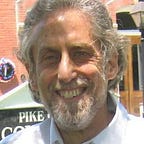Michael Pollan’s Brain — on Drugs
Neither LSD nor magic mushrooms harm you. They are not addictive, toxic, debilitating or destructive. They cause no illness and have no side effects. They seem to unlock receptors in the brain, causing mashups and unexpected connections (and therefore perceptions). They dissolve the ego by restricting blood flow to the Default Mode Network of the brain, which can cause users to lose the border between their persona/self/ego and everything else (eg. the universe). These are some of the attitude-changing revelations in How to Change Your Mind.
Psychedelics do not take over (unless you allow it). You can manipulate your bad trip as well as your good trip if you so desire. You can switch from love to hate, you can send demons away, and explore more of what you are appreciating. It’s something like directing your dreams, except you will remember everything, and it will change your outlook. Possibly for life.
Michael Pollan has done the research and tried four different psychedelics, always under the administration of guides, either underground/outlaws or in labs. They were psilocybin (mushroom), LSD (artificial chemical compound), DMT (the venom of the Sonoran toad), and ayahuasca (Brazilian plant compound). How to Change Your Mind is an exploration of the experience and the potential of these chemicals. From what Pollan has seen, it is all very positive. And he is not alone. Engineers, doctors and other researchers all seem to have one thing in common: once they’ve tried psychedelics themselves, they want absolutely everyone to try them too. No other drug has that rep.
The mind-expanding powers of psychedelics is a function of the infinite connections the brain goes through when its receptors are unlocked and the Default Mode Network (DMN) powers down. The DMN runs the core brain and defines the ego/conscious/persona. It fights to keep control and sends corrective signals to reinforce what it has learned over its lifetime, to the point of denying/correcting what you see in front of you.
We spend our lives specializing, becoming more expert in an ever-decreasing number of subjects. To the DMN, anything that diverts from that is irrelevant and a waste. The ego actively suppresses them. So we lose our childlike appreciation of most everything. We also become set in our ways and our perceptions.
By opening up to all the possibilities at once, users flood themselves with new appreciations and insights — to plants, animals, the planet, the stars, music — anything that pops into their minds during their trip. Instead of all inputs being directed to their appropriate receptors, it is possible for music to have shape and color, for rocks to become animated, for objects to melt into the scenery. And for the now borderless, bodiless self to merge with nature (“I was swimming in the ocean. I was the ocean” for example). Suddenly, absolutely everything is possible.
For all the dozens of trips Pollan describes, the most common change is being one with nature or the universe (for some it is seeing God). No one seems to have incredible sex or become fabulously wealthy. It’s not about peace on Earth, but merging with and appreciating the facets of the universe. And as Pollan found, “You bring a different self to the journey every time.” Perhaps disappointingly, he says, the most common takeaway from psychedelic trips is that love is everything. Trite, but that by itself seems to change everyone who tries them.
When directed by guides, psychedelics help the dying be relieved and appreciate their position and role in the universe. (Aldous Huxley had his wife inject him with one final dose of LSD on his deathbed.) It has stopped people from smoking because smoking is so superficial and irrelevant. It can reverse depression and anxiety. And it’s all quite illegal, thanks in large part to Timothy Leary.
There is a long tale of Timothy Leary in all this. He is reviled by the community for making such loud and obnoxious noises that all such compounds became illegal and research all but completely halted. Leary set back the discipline by decades, though at the same time, he made it known to the world. His gleefully unscientific approach (Tune in, turn on, drop out) remains a horror to medicine to this day. They’re still trying to live down that reputation.
Pollan is not the most economical of writers. The book could have been a hundred pages shorter and still imparted the same information. There is a lot of description, history, speculation and self-questioning that becomes a little tiresome. It often reads like an infomercial, with endless testimonials from satisfied customers — including Pollan — that on television would be followed by an 800 number. But the information he delivers is valuable. He dispels myths, corrects wrong impressions and sets the record straight.
The science of the brain is fascinating. We are still just cracking the code. Importantly, Pollan shows how seriously beneficial such compounds can be, and how seriously research scientists take them. There is a huge future for psychedelics in medicine. How to Change Your Mind tackles the small-mindedness (in every sense of the term) and beats it up pretty good.
David Wineberg
(How to Change Your Mind, Michael Pollan, June 2018)
